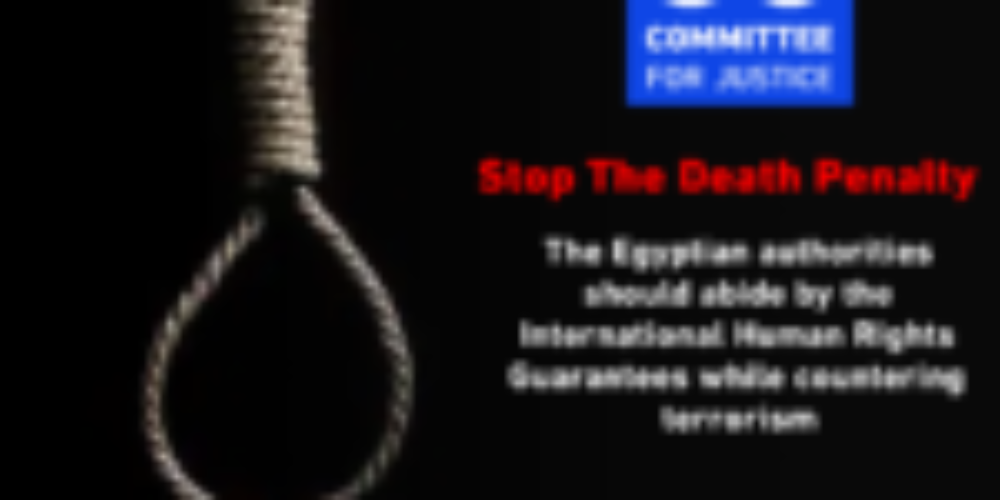The Egyptian authorities should abide by the International Human Rights Guarantees while countering terrorism
Committee for Justice received the news of the mass death sentencing carried out by the Egyptian authorities against eight defendants convicted under case No. 165 of the year 2017, known in the media as the “bombing churches” case, with great sadness and concern. The Egyptian authorities still turn a blind eye to all domestic and international demands to end Death Penalty, which has long been distorted by numerous suspicions and evidences that clearly show an abuse of the law by the judicial power and arbitrariness in issuing judgments, especially in cases of a political nature that lack all guarantees of a fair trial and in which the Egyptian judiciary is the opponent and the ruler at the same time. Therefore, Committee for Justice calls on the Egyptian State to immediately refrain from carrying out executions and amend domestic laws as to repeal the death penalty.
The organization emphasizes the duty of the Egyptian State to abide by all international conventions and treaties it has signed and ratified as stated in the Egyptian constitution, amend the domestic laws to be in accordance with the international standards that ensure the protection and promotion of human rights, especially in the context of countering terrorism, and end the trial of civilians before Military Courts. Committee for Justice also calls on the Egyptian authorities to accept the recommendations of the states raised during the Universal Periodic Review session in November 2019 in the Human Rights Council, the foremost of which was the immediate end of the death penalty.
As we support the Egyptian authorities in their legitimate war on terrorism, we firmly underline their responsibility to adhere to proper legal procedures that guarantee to all citizens fair trials and unbiased punishment. It is worth mentioning here that this does not mean in anyway defending the accused or claiming their innocence from what is attributed to them under such cases, as this is not our role to demonstrate the extent of their involvement in such crimes. However, what we are focusing on here is the duty of the Egyptian State to ensure all guarantees to fair trials for all defendants and the honest commitment of the Egyptian judicial and executive powers to these guarantees in these cases as well as in others.
On Monday the 24th of February 2020, the Egyptian authorities sentenced eight persons, who were convicted by the Military Criminal Court under case No. 165 of 2017, to death penalty. This case is traced back to the series of bombings targeted the Abbasiya Cathedral in Cairo in December 2016, the Churches of St. George in Tanta and the Two Saints Church in Alexandria in April 2017, which resulted in the death of dozens of citizens and to the attack that targeted Al-Naqab checkpoint in Al-Wadi Al-Jadid in January 2017, which resulted in the fall of a police officer and a number of recruits.
Committee for Justice has issued a report on this case, in which it examines the facts and the proceedings of the investigations and the trials and concludes that the Egyptian authorities have made a clear effort in tracking down the perpetrators, used technical and scientific investigation procedures that are significantly shown in the case papers, and arrested 33 out of a total of 48 suspects in the case between January and June 2017. However, these procedures lost their legitimacy because of the practices carried out by the Egyptian security services that violated the rights of the defendants, like subjecting them to enforced disappearance for varying periods and exposing them to material and moral intimidations, as it was stated by the defendants themselves in the case records. This disrupted their rights to defense, which is a core right guaranteed by the Egyptian laws and constitution.
Shaima Abu Al-Khair, Communication and Advocacy Officer in Committee for Justice, said that “terrorism and extremism nurture in countries where there is widespread impunity for crimes committed against human rights, where democracy, development, the foundations of justice, and rule of law are absent, where the emergency systems are becoming the norms, and where there is an excessive use of surveillance systems and restriction of freedoms. These factors render countries more vulnerable to terrorist incidents and the measures taken in the context of combating terrorism ineffective. Abu Al-Khair adds: “Therefore, Egypt must respect, protect, and promote the rights of all individuals and prioritize these rights over any other goal it aspires to. Ensuring Human rights is a goal in itself and must be considered as such.”
The harsh and inhuman treatment in prisons and detention facilities, including corruption of security officers and overcrowded detention cells, has played a major role in recruiting a large number of individuals into violent extremist groups and terrorist organizations, and case No. 165 of 2017 addressed here is a relevant example. Hence, Committee for Justice calls on the Egyptian authorities to take the needed preventive measures to stop the spread of extremist ideologies among prisoners while preserving the protection granted under international law for persons deprived of their liberty, including the norms related to solitary confinement and the Standard Minimum Rules for the Treatment of Prisoners.
Committe for Justice firmly believes that a criminal justice system that is based on respect for human rights, especially the right to life, and the rule of law and observes due processes and fair trial standards could effectively combat terrorism and ensure effective accountability.
Committe for Justice urges the Egyptian government to adhere to international human rights law in its process of countering terrorism and violent extremism and to avoid taking measures that intentionally target specific persons or groups in a discriminatory manner or restrict rights and freedoms or affect them negatively, especially freedom of expression, freedom of thought, of association, of assembly, and right to privacy, and ensure the respect of the principles of necessity and proportionality.





